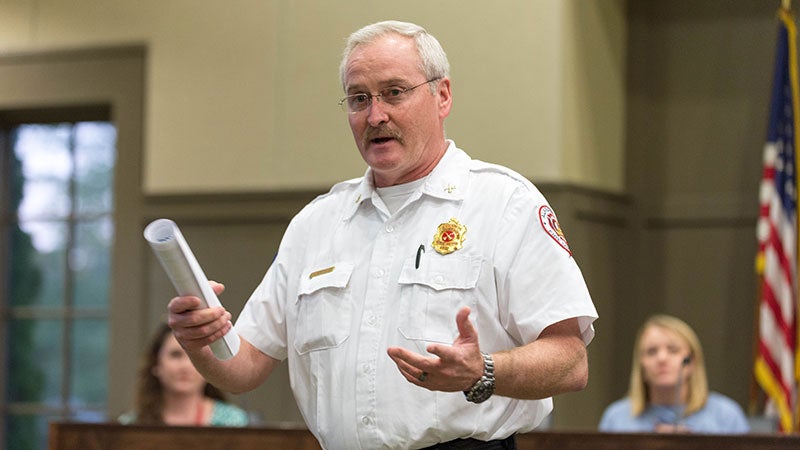Remove the stigma: Alabaster town hall talks mental health issues
Published 10:01 am Friday, October 27, 2017

- Former Alabaster Fire Department Capt. Tim Love will serve as the department's new chief, after he was approved by the City Council during a Feb. 26 meeting. (File)
By NEAL WAGNER / Managing Editor
ALABASTER – For the city of Alabaster, the end of 2017 can’t come quickly enough. Over the past several months, the city has experienced multiple tragedies tied to mental health issues and suicide.
“Alabaster has experienced a really rough year in 2017. It began in February (with the death of Diana Hussey). When she lost her battle, it really shook the community as a whole,” said Alabaster Mayor Marty Handlon. “Our community has suffered great losses this year, and we can’t begin to help people until we remove the stigma.”
On the evening of Oct. 26, the city took its latest step toward combating similar tragedies by hosting its second mental health town hall meeting at City Hall. During the meeting, city leaders assembled a panel of local emergency responders and representatives from agencies serving those with mental health issues.
Through the event, the city is looking to reverse some disturbing trends in Alabaster, Shelby County and the state.
“As a society, we are in an environment where we are treating pain, and it is creating a situation where people who had no previous issues are becoming addicts,” said Alabaster Fire Department Capt. Tim Love, noting many are turning to substance abuse as a coping method for underlying and untreated mental health issues. “It’s gotten so bad that the state EMS is actually working on a grant to help us recoup our costs for Narcan, which is what we use to treat opioid overdoses. We are having to use it on a daily basis.”
Love said the AFD encourages victims of substance abuse and mental health issues to get help when responding to calls, firefighters are limited for what they can do for patients who are not presenting an immediate danger to themselves or others.
In addition to the AFD, Chilton-Shelby Mental Health, Alabaster City Schools, Bradford Health Service, Shelby County Probate Court, SafeHouse of Shelby County, the Shelby County District Attorney’s Office, Church of the Highlands and NAMI were represented at the meeting, and shared information about the services they provide to locals facing crises or mental health issues.
“We need to be able to say ‘I need a little bit of help right now.’ We need to reconnect with each other,” said Shelby County Assistant District Attorney Alan Miller. “We need to admit that our brain can get sick and we need to give it time to get better.”









